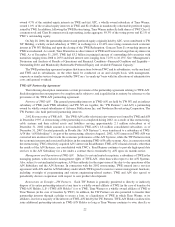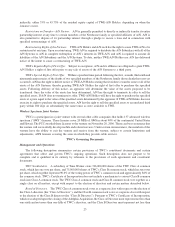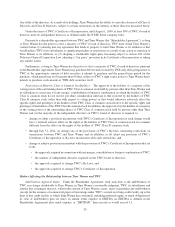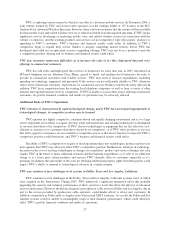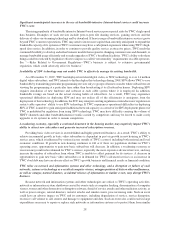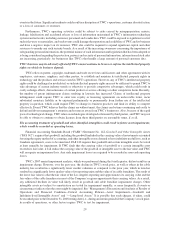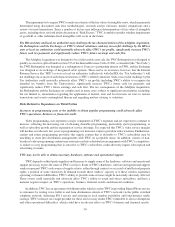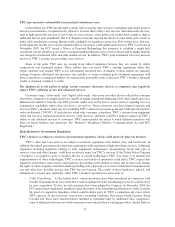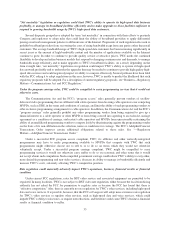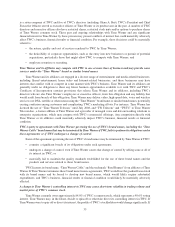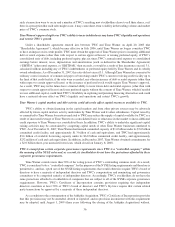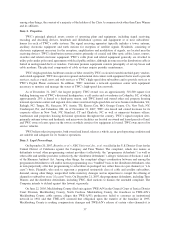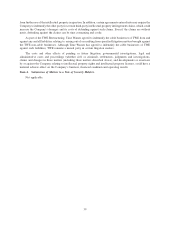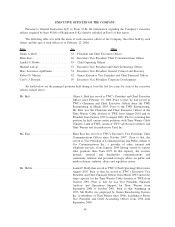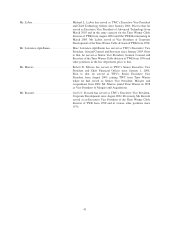Time Warner Cable 2007 Annual Report Download - page 36
Download and view the complete annual report
Please find page 36 of the 2007 Time Warner Cable annual report below. You can navigate through the pages in the report by either clicking on the pages listed below, or by using the keyword search tool below to find specific information within the annual report.TWC may encounter substantially increased pole attachment costs.
Under federal law, TWC has the right to attach cables carrying video services to telephone and similar poles of
investor-owned utilities at regulated rates. However, because these cables carry services other than video services,
such as high-speed data services or new forms of voice services, some utility pole owners have sought to impose
additional fees for pole attachment. The U.S. Supreme Court has rejected the efforts of some utility pole owners to
make cable attachments carrying Internet traffic ineligible for regulatory protection. Pole owners have, however,
made arguments in other areas of pole regulation that, if successful, could significantly increase TWC’s costs and, in
November 2007, the FCC issued a Notice of Proposed Rulemaking that proposes to establish a single pole
attachment rate for all utility pole owners carrying broadband internet access services that would be higher than the
rate charged for traditional cable and cable modem service. In addition, TWC’s pole attachment rates may increase
insofar as TWC’s systems are providing voice services.
Some of the poles TWC uses are exempt from federal regulation because they are owned by utility
cooperatives and municipal entities. These entities may not renew TWC’s existing agreements when they
expire, and they may require TWC to pay substantially increased fees. A number of these entities are currently
seeking to impose substantial rate increases. Any inability to secure continued pole attachment agreements with
these cooperatives or municipal utilities on commercially reasonable terms could cause TWC’s business, financial
results or financial condition to suffer.
The adoption of, or the failure to adopt, certain consumer electronics devices or computers may negatively
impact TWC’s offerings of new and enhanced services.
Customers using “cable-ready” and “digital cable-ready” televisions and other devices offered by consumer
electronics companies or computing devices capable of tuning, storing and displaying cable video signals may use a
different user interface from the one TWC provides and/or may not be able to access services requiring two-way
transmission capabilities unless they also have a set-top box. These customers may have limited exposure and
access to TWC’s advanced video services, including TWC’s interactive program guide and VOD and subscription-
video-on-demand (“SVOD”). If such devices attain wide consumer acceptance, TWC’s revenue from equipment
rental and two-way transmission-based services could decrease, and there could be a negative impact on TWC’s
ability to sell advanced services to customers. TWC cannot predict the extent to which different interfaces will
affect its future business and operations. See “Business—Regulatory Matters—Communications Act and FCC
Regulation.”
Risks Related to Government Regulation
TWC’s business is subject to extensive governmental regulation, which could adversely affect its business.
TWC’s video and voice services are subject to extensive regulation at the federal, state, and local levels. In
addition, the federal government also has been exploring possible regulation of high-speed data services. Additional
regulation, including regulation relating to rates, equipment, technologies, programming, levels and types of
services, taxes and other charges, could have an adverse impact on TWC’s services. If the United States Congress
(“Congress”) or regulators were to disallow the use of certain technologies TWC uses today or to mandate the
implementation of other technologies, TWC’s services and results of operations could suffer. TWC expects that
legislative enactments, court actions, and regulatory proceedings will continue to clarify and in some cases change
the rights of cable companies and other entities providing video, data and voice services under the Communications
Act and other laws, possibly in ways that TWC has not foreseen. The results of these legislative, judicial, and
administrative actions may materially affect TWC’s business operations in areas such as:
•Cable Franchising. At the federal level, various provisions have been introduced in connection with
broader Communications Act reform that would streamline the video franchising process to facilitate entry
by new competitors. To date, no such measures have been adopted by Congress. In December 2006, the
FCC adopted new regulations intended to limit the ability of local franchising authorities to delay or refuse
the grant of competitive franchises, which could facilitate entry by TWC’s competitors into areas where
TWC operates. At the state level, several states, including California, New Jersey, North Carolina, South
Carolina and Texas, have enacted statutes intended to streamline entry by additional video competitors,
some of which provide more favorable treatment to new entrants than to existing providers. Similar bills are
31



